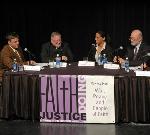Must Lawyers Disclose Their Role as Ghostwriter?
 Professor Michael W. Loudenslager of Appalachian School of Law has ventured into the thorny thicket of affirmative duties to disclose in his provocative article, Giving Up the Ghost: A Proposal for Dealing With Attorney “Ghostwriting” of Pro Se Litigants’ Court Documents Through Explicit Rules Requiring Disclosure and Allowing Limited Appearances for Such Attorneys, 92 Marq. L. Rev. 103 (2008). The crux of the issue is whether behind-the-scenes drafting of one or more litigation documents for a pro se litigant, by a lawyer who does not appear in the matter nor otherwise disclose her involvement, constitutes misconduct. The principal concern is whether the court and adversary are likely to be misled inappropriately by the nondisclosure. The issue arises frequently because so many matters must go to court, from collection cases to divorces to traffic offenses, and the cost of full representation is either beyond the reach of many litigants or is, in their judgment, not cost-effective. The authorities are divided as to whether disclosure should be required. Loudenslager does a fine job of taking us through the arguments and offers a solution of his own. It makes for engaging and thought-provoking reading.
Professor Michael W. Loudenslager of Appalachian School of Law has ventured into the thorny thicket of affirmative duties to disclose in his provocative article, Giving Up the Ghost: A Proposal for Dealing With Attorney “Ghostwriting” of Pro Se Litigants’ Court Documents Through Explicit Rules Requiring Disclosure and Allowing Limited Appearances for Such Attorneys, 92 Marq. L. Rev. 103 (2008). The crux of the issue is whether behind-the-scenes drafting of one or more litigation documents for a pro se litigant, by a lawyer who does not appear in the matter nor otherwise disclose her involvement, constitutes misconduct. The principal concern is whether the court and adversary are likely to be misled inappropriately by the nondisclosure. The issue arises frequently because so many matters must go to court, from collection cases to divorces to traffic offenses, and the cost of full representation is either beyond the reach of many litigants or is, in their judgment, not cost-effective. The authorities are divided as to whether disclosure should be required. Loudenslager does a fine job of taking us through the arguments and offers a solution of his own. It makes for engaging and thought-provoking reading.

